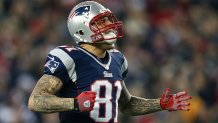Less than two years ago, Aaron Hernandez was one of the most exciting players to watch in the NFL, a talented tight end who had signed a $40 million contract extension with the New England Patriots. The once rising star grew up in Bristol, Connecticut, the son of a locally acclaimed high school tailback, and starred at the University of Florida before being drafted into the NFL.
But his fall was fast. On June 28, 2013, Hernandez was arrested in the killing of his friend, Odin Llyod, a semipro football player. Later that day, the Patriots released him. Within a year, a Massachusetts grand jury had also charged him in a double homicide from 2012 in Boston, and authorities in Florida announced they wanted to talk to him about two earlier unsolved shootings.
Hernandez, 25, has pleaded not guilty to all of the charges.
With his trial set to begin on Friday in the first of the killings, here are five things to know about the former All-American and the grisly crimes he is accused of committing.
Hernandez is accused of killing three men after nightclub disputes
Odin Lloyd, a semipro football player, was found shot multiple times in an industrial park in North Attleborough, Massachusetts, less than a mile from Hernandez’s home. Lloyd, 27, was dating a sister of Hernandez’s fiancee and had been out with Hernandez two nights earlier at the Rumor nightclub in Boston. Prosecutors say that following a fight that night, sparked by one of Lloyd’s cousins, an incensed Hernandez decided to kill him.
After Hernandez became a suspect in Lloyd’s killing, authorities got an anonymous tip that he had been involved in the deaths of two men a year earlier. Daniel de Abreu and Safiro Furtado died in a drive-by shooting in Boston after leaving the Cure Lounge. Authorities say one of the men had accidentally bumped into Hernandez inside the club, spilling his drink.
U.S. & World
Were there other Hernandez shooting victims?
Alexander Bradley, who authorities say was with him the night of the double homicide, accuses Hernandez of shooting him in the eye during another fight at a Florida strip club. Bradley has brought a civil suit against Hernandez. Hernandez, in legal papers, has invoked his right not to incriminate himself under the Fifth Amendment.
Two other men, Corey Smith and Justin Glass, were wounded in Florida in 2007 after a dispute in a nightclub with University of Florida football players. The men were also shot while their car was stopped at a red light nearby. After Hernandez was arrested for the Massachusetts murder, the Florida state attorney, Bill Cervone, said investigators were interested in talking to Hernandez, who was a tight end for the Florida Gators at the time. According to a 2007 Gainesville police report, Hernandez was in the area, but when police tried to interview him he asked for a lawyer. The case remains unsolved.
The judge in the Fall River case, Susan Garsh, has ruled that there can be no references to the murders in Boston, which prosecutors have suggested might have contributed to Hernandez's motive for killing Lloyd, nor to the shooting of Bradley.
Football notables could be on witness list
New England Patriots head coach Bill Belichick and the team’s owner, Robert Kraft, could be called to testify in the trial, according to court documents. In an interview after Hernandez’s arrest, Belichick said he was disappointed and hurt.
“Having someone in your organization that’s involved in a murder investigation is a terrible thing,” he said.
Kraft released a letter in which Hernandez wrote about his alleged use of marijuana while at the University of Florida and agreed to take biweekly drug tests if he were drafted.
Of the charges, Kraft said, “If this stuff is true, then I’ve been duped and our whole organization has been duped.”
Other potential witnesses: Former Florida teammates Brandon Spikes, who is a former Patriot and now plays for the Buffalo Bills, and Mike Pouncey, a center for the Miami Dolphins. Hernandez’s fiancee, Shayanna Jenkins could also be called.
No football gear in the courtroom
Those planning to attend the trial must leave their football jerseys at home. The judge has specifically banned clothing and buttons that display logos of the New England Patriots or other NFL teams or any football-related insignia. Anyone in football gear will be barred from entering the Fall River Justice Center.
Hernandez wore Number 81.
But jurors will be able to see Hernandez's trophies when they visit his home. The judge ruled that prosecutors will not be able to cover a trophy case. One of Hernandez's lawyers, James Sultan, had argued that the house should be shown the way it appeared at the time of Lloyd's death.
Clues in the tattoos?
Hernandez’s upper body is covered in tattoos, including the face of a lion on his right bicep with the words, “It’s about the fight in you;” 1989, the year of his birth, on the fingers of his left hand; and a phrase his father likes, “If it is to be it is up to me,” on his left forearm. An Associated Press article in June said that prosecutors were interested in Hernandez’s right forearm but would not specify which tattoos.

[[ 287973791, C]]



